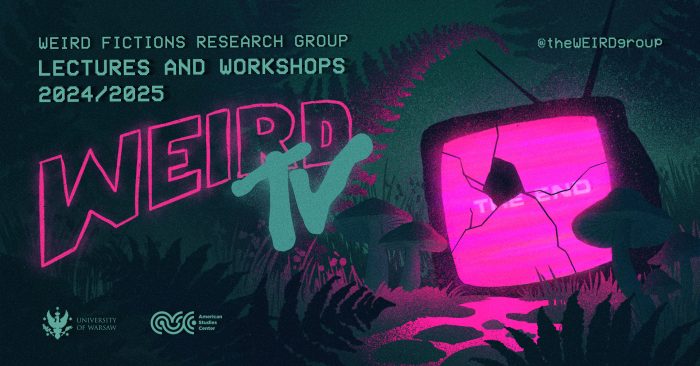Weird Fiction Research Group kindly invites you to the second Weird TV meeting in spring semester!
Sherryl Vint (University of California, Riverside)
Anachronistic Retrofuturism and the Cosmic Indifference of the Workplace
Thursday, March 13, 2025
4:45 pm
*3 OZN*

Where?
Dobra 55, room: 2.118
(the building features some mobility accommodations: ramp and lift)
What?
This talk centers the anachronistic office work setting and technologies of the tv series Severance (2022–) to argue that the series exemplifies the aesthetic techniques of the Weird even as it reorients the site of horror from the indifference of the universe to the sociopathy of neoliberal capitalism. If the original concept of Weird Fiction stressed the impotence of human beings within a universe ruled by forces that greatly exceed our power and that are, at best, indifferent to our fate, Severance confirms that these forces are, worse, malign as it locates them in the corporate priorities of the tech company Lumon Industries and its reduction of humans to human capital. The retrofuturist aesthetic of the series, a technique by other recent weird television such as Tales from the Loop (2020) and Hello Tomorrow (2023), simultaneously evoke both the future and the past: insisting on the future as a site of utopian possibility, the corporations at the heart of each series betray, through their retrofuturist design, that futures made hopeful by technology are nostalgically associated with past rather than contemporary contexts. The retrofuturist aesthetics seem to suggest that the only way to imagine a “good” future is by returning to the past, almost as if to undo the twenty-first century thus far and try to take another path, while the Weird elements of the series suggests that tech companies such as Lumon are erasing previous concepts of consensual reality and substituting new bespoke realities that ask us to regard corporate power as akin to divine.
Who?
Sherryl Vint is Professor of Media and Cultural Studies and of English at the University of California, Riverside, where she founded the Speculative Fictions and Cultures of Science program. She has published widely on science fiction, including, most recently, Biopolitical Futures in Twenty-First Century Speculative Fiction (2021), Science Fiction: The Essential Knowledge (2021), and Programming the Future: Speculative Television and the End of Democracy (2022, co-authored with Jonathan Alexander). She was a founding editor of Science Fiction Film and Television and is the Managing Editor of Science Fiction Studies and editor of the book series Science in Popular Culture.




